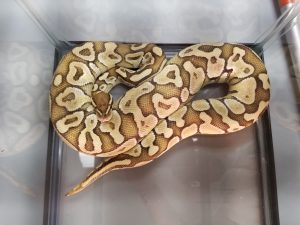News release on snake in Hilo
Posted on Oct 18, 2019 in Latest Department News
Snakes are illegal to transport and possess in Hawaii. It is not known how the snake may have gotten to the heavily forested area. HDOA agricultural inspectors are conducting a search of the area and will be deploying traps to help ensure that no other snakes are in the area.
In June 2018, a 4 ½ foot long ball python was found at the South Hilo Sanitary Landfill by county workers. The origin of that snake is still unknown.
“We do not encourage people to handle snakes that they may find because the species and condition of the snake may not be easily determined,” said Phyllis Shimabukuro-Geiser, chairperson of the Hawaii Board of Agriculture. “If possible, they should try to contain it and prevent its escape and contact the state’s toll-free pest hotline at 643-PEST (7378) or the police department.”
Ball pythons are common in the pet trade and are native to Sub-Saharan Africa. They are constrictors that subdue prey by coiling around it, causing death by suffocation. Their diet usually consists of small mammals and birds. Ball pythons may grow up to six feet long.
Snakes and large reptiles have no natural predators in Hawaii and pose a serious threat to Hawaii’s unique ecosystem as they compete with native animal populations for food and habitat. Many species also prey on birds and their eggs, increasing the threat to our endangered native birds. Large snakes may also be a threat to humans and small pets.
Individuals possessing illegal animals may be charged with a class C felony, face fines of up to $200,000, and three years in prison. Anyone with information on illegal animals should call the state’s toll-free PEST HOTLINE at 643-PEST (7378). Individuals who have illegal animals are encouraged to turn them in under the state’s amnesty program, which provides immunity from prosecution. Illegal animals may be turned in to any HDOA Office, Honolulu Zoo or any Humane Society – no questions asked and no fines assessed. If illegal animals are turned in prior to the start of an investigation, there will be no criminal charges or civil penalties.
# # #
Media Contact:
Janelle Saneishi, Public Information Officer
Hawaii Department of Agriculture
808.973.9560